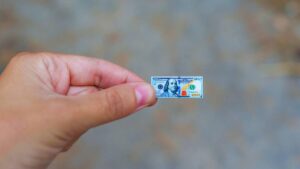Health Check: It’s a wipe out! Percheron shares tumble up to 91pc on rare genetic disease trial failure

Pic via Getty Images
- Percheron’s Duchenne muscular dystrophy trial has been a compete flop
- Canaccord Genuity says Opthea shares are worth at least double their current price
- Neurizon asks US regulator for motor neurone disease trial go-ahead
Firstly, full points for Percheron Therapeutics (ASX:PER) for honestly disclosing that its long-awaited Duchenne muscular disease trial was a complete and utter flop and that the company will terminate the program “as soon as practicable”.
No attempt at egging secondary endpoints or data mining the results from an exotic sub-group of patients – and only a feeble attempt at talking up alternative programs.
Percheron shares lost almost all their value after the company this morning announced the top-line results from its phase 2b trial, which showed no difference between the use of its candidate avicursen (ATL-1102) and the placebo control group.
A regressive, fatal and poorly treated disease, Duchenne muscular dystrophy affects about one in 10,000 males (or 300,000 in all).
The disease results from a gene mutation, which affects production of the muscle protein dystrophin, causing movement-related muscle damage leading to chronic inflammation and progressive loss of function.
ATL1102 was intended to inhibit the VLA-4 protein, also known as CD49d, thus “exerting an immune-modulatory effect which may be therapeutic in a range of inflammatory diseases”.
But the trial failed its primary endpoint, which measured upper limb function at week 25 of treatment, compared with placebo.
“There were no statistically significant differences in efficacy on available secondary endpoints, nor was there a clear directional trend toward benefit associated with administration of avicursen,” the company said.
At least the drug was “safe and well tolerated” and the company is using this virtue to consider other uses for avicursen.
The trial enrolled 48 wheelchair-bound boys across 16 hospitals in five countries. To avoid the ethical issues of some boys not receiving the active treatment, the placebo group was re-allocated to the active group after six months.
The company will carry out a strategic review of its pipeline in the June half of 2025.
“We are of course disappointed by these results,” says Percheron chief Dr James Garner.
“In the more rigorous environment of a randomised, placebo-controlled, international study, avicursen has not performed in the way that we had been led to expect from earlier studies.”
Garner says the company remains well funded, having just raised $14.8 million in a placement and share purchase plan. At the end of September, the company had cash on hand of $8 million.
“Although these results may not be as we had hoped, we are proud to have played a small role in advancing understanding of the disease and in bringing hope to those affected by it,” Garner says.
In October Patrys (ASX:PAB) said it would not go ahead with a planned first-in-human trial of its lead cancer drug candidate PAT DX-1, citing manufacturing shortcomings which meant the compound was too risky to use in humans.
The Percheron and Patrys experiences show that while 2024 saw many clinical successes across the sector, drug development remains a highly risky pursuit.
Having emerged from Monday’s trading halt, Percheron shares were trading 86% lower at 0.8 cents.
Broker sees double on Opthea shares
Broker Canaccord Genuity has initiated coverage on Opthea (ASX:OPT) – and reckons the eye-diseases house is worth at least twice its current valuation.
There’s a big ‘if’ though: Opthea’s two phase III trials for the debilitating wet aged-related macular degeneration (wet AMD) need to come up trumps.
(Refer to item one for ‘risk factors’.)
But the firm is confident of positive results, given earlier trials showed ‘statistically significant and clinically relevant improvements” in patients treated with Opthea’s candidate, OPT-302 (sozinibercept).
In other words: the patients could read more words on an eye chart than otherwise would have been the case.
The firm estimates a 65-70% probability of success.
Current therapies inhibit a protein called VGEF-A, which regulates blood vessel growth and survival. But many wet AMD patients are resistant to VEGF-A inhibitors.
OPT-302 applies to the VGEF C and D variants, thus offering a broader treatment pathway, but the trials are in conjunction with the standard-of-care inhibitors.
Trial results are expected in mid-2025 and – either way – the earth will move for Opthea holders.
Canaccord ascribes a ‘target price’ of $1.25, compared with this morning’s price of 63 cents. Should OPT-302 be approved, Canaccord estimates peak sales of US$1 billion annually, in which case the stock should be more like $3.
Neurizon asks FDA for trial go-ahead
Neurizon Therapeutics (ASX:NUZ) has filed an Investigational New Drug application with the US Food and Drug Administration (FDA), which amounts to a request for permission to kick off its proposed phase I/II motor neurone disease trial.
The trial will be done within the auspices of Healey, a program that assesses several motor neurone disease candidates at once. As well as enabling a comparison with what else is out there, Healey is a cheaper and more efficient way to carry out a trial.
Neurizon’s drug candidate NUZ-001 targets a protein called TDP-43, “a hallmark of ALS [motor neurone disease] pathology.”
The FDA has 30 days to accept or reject the submission, so the clock is ticking.
The company expects to start Healy patient enrolment in the first half of 2025.
Neurizon shares were steady at 17.5 cents.
How Prescient, a new chief
Immuno-oncology developer Prescient Therapeutics (ASX:PTX) has found a new CEO to replace Steven Yatomi-Clarke, who exits at the end of February.
The new guy is James McDonnell, who has more than 25 years’ industry experience including gigs at Pharmion and CSL, where most recently he was local head of patient blood management.
For his efforts, McDonnell receives a fixed salary of $390,250 a year, plus 24 million options exercisable within five years. But the share price must be more than 75% higher for them to be of any worth.
McDonnell would receive short-term incentives equal to 30% of his base salary and long-term incentives, subject to performance milestones.
Prescient shares were unchanged at 4.3 cents.
Related Topics

UNLOCK INSIGHTS
Discover the untold stories of emerging ASX stocks.
Daily news and expert analysis, it's free to subscribe.
By proceeding, you confirm you understand that we handle personal information in accordance with our Privacy Policy.








